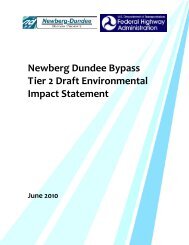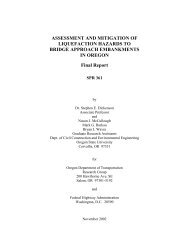Oregon Balance of State HIV/AIDS Housing & Services Systems ...
Oregon Balance of State HIV/AIDS Housing & Services Systems ...
Oregon Balance of State HIV/AIDS Housing & Services Systems ...
You also want an ePaper? Increase the reach of your titles
YUMPU automatically turns print PDFs into web optimized ePapers that Google loves.
A-46 Appendices—<strong>Oregon</strong> <strong>HIV</strong>/<strong>AIDS</strong> <strong>Housing</strong> and <strong>Services</strong> <strong>Systems</strong> Integration Plan<br />
GOALS & DESCRIPTIONS<br />
A service organization purchases<br />
condominiums or single-family homes<br />
and leases the units to PLWHA<br />
Best in communities with active<br />
housing markets and networks that can<br />
deliver services to dispersed<br />
populations<br />
Congregate living assistance ranging<br />
from a group home owned by a service<br />
organization to a housemate referral<br />
service<br />
Best where consumer preference<br />
indicates sufficient demand to keep<br />
beds filled<br />
Independent apartment projects to<br />
meet the permanent housing needs <strong>of</strong><br />
PLWHA, or to serve a mixed<br />
population that includes PLWHA<br />
Best where consumer preference<br />
indicates sufficient demand to keep<br />
units filled<br />
ASSISTANCE TYPES &<br />
HOPWA–ELIGIBLE USES<br />
Scattered Site Acquisition<br />
- Can fund acquisition, rehab,<br />
etc. (new construction for SRO<br />
and group homes only)<br />
Group Homes/Shared Living<br />
- Can fund acquisition, rehab,<br />
etc.<br />
- Can fund facility operations<br />
Independent Apartment<br />
Development Projects<br />
- Can fund acquisition, rehab,<br />
etc. (new construction for SRO<br />
and group homes only)<br />
- Can fund monthly lease,<br />
operations, and repair costs<br />
ADVANTAGES DISADVANTAGES<br />
- Can allow quick access to<br />
housing, relative to construction<br />
- Can effectively meet scattered<br />
demand<br />
- A small number <strong>of</strong> units can be<br />
developed efficiently<br />
- Residents can integrate into the<br />
community<br />
- Can be less expensive than<br />
individual apartments<br />
- Can <strong>of</strong>fer peer support<br />
- Various organizations can<br />
sponsor individual rooms<br />
- Creates new long-term housing<br />
capacity<br />
- Offers owner most control, or<br />
opportunities to partner with<br />
other organizations<br />
- Units can be developed to<br />
address specific needs<br />
- Large development projects<br />
can increase an organization’s<br />
capacity to raise private<br />
donations and grants<br />
- Creates new long-term housing<br />
capacity<br />
- Can require complicated property<br />
management<br />
- Operating subsidies may be needed<br />
to keep rents affordable<br />
- Condominiums can require monthly<br />
maintenance fees and other costs;<br />
<strong>of</strong>fer less control than traditional<br />
ownership; and place restrictions on<br />
residents<br />
- Most consumers prefer independent<br />
living; many prefer not to live in<br />
<strong>HIV</strong>/<strong>AIDS</strong>-dedicated facilities<br />
- If demand drops, difficult to convert<br />
facility to new use<br />
- Can be difficult to manage conflicts<br />
between housemates and to preserve<br />
confidentiality<br />
- Expensive, complex, and timeconsuming<br />
- Multifamily-zoned land can be hard<br />
to find<br />
- Can attract community opposition<br />
- Number <strong>of</strong> units needed for<br />
economic efficiency may be greater<br />
than local demand for <strong>AIDS</strong> housing<br />
- Many consumers prefer not to live<br />
in <strong>HIV</strong>/<strong>AIDS</strong>-dedicated facilities<br />
- Requires long-term commitment<br />
and operating subsidies

















